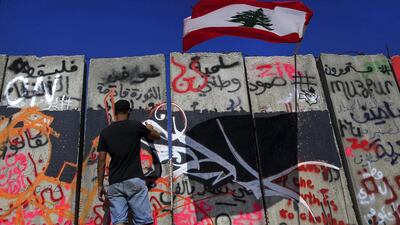Anti-corruption protests in Lebanon and Iraq have once again brought to the fore the underlying socio-economic woes that sparked the Arab Spring in 2011.
When Tunisian street vendor Mohamed Bouazizi doused himself with petrol on December 17, 2010, it symbolised the exasperation felt across the Arab world with self-serving elites that had long neglected the public interest.
The uprisings in 2011, which spread from Tunisia to Egypt and Libya, were far different from the largely sectarian conflicts raging across the region today. The main points of contention then were social justice, dignity and lack of opportunity.
However, the current wars in Syria, Iraq, Yemen and Libya have served as distractions from the social and economic concerns that caused much of the region’s instability in the first place.
The public push for improved living standards took a back seat as sectarianism, terrorism and regional power struggles came to dominate the Middle East.
Over the weekend, thousands took to the streets in Lebanon and Iraq to air similar frustrations: rampant corruption among the political class, incompetent governance, rising poverty and a lack of basic services.
The two nations suffer from chronic electricity outages and poor water supply – largely the fault of a corrupt political elite that sees no incentive in playing their roles as public servants.
In both countries, polarised by sectarian politics and powerful militias, the protests were unprecedented in their non-sectarian and grassroots nature.
For the Lebanese, it was the visible realisation that regardless of sect and political affiliation, they are all collectively suffering from the gross mismanagement of their country.
One Hizbollah supporter participating in the protests told Al Jadeed television: “I am against everyone who is an MP or minister, regardless of [which party] they belong to.”
In Baghdad, Iraqis chanted against the sectarian divide between Sunnis and Shiites while railing against the inefficiency of the government.
The lesson from the Arab Spring was that you can only push people so far before they react.
The breaking point for Tunisians was Bouazizi’s public humiliation at the hands of the police. For Iraqis, it was electricity outages during this summer’s heat wave where temperatures soared to 50°C. For Lebanon, the tipping point was the collapse in the management of rubbish collection, resulting in piles of refuse lining the streets for weeks.
These incidents served to channel wider discontent with the overall system.
Protesters in Lebanon say their concerns go beyond the issue of garbage collection, which they see as symptomatic of a dysfunctional political system that needs a complete overhaul.
Similarly in Iraq, what began as a complaint against electricity shortages turned into public anger at widespread corruption and cronyism.
The protests in Lebanon and Iraq have converged on the same core issues that are endemic across the region – social justice, dignity and worsening living conditions.
For Lebanon and Iraq, two states already suffering political instability, the consequences of dismissing public concerns for improved living standards can be potentially dangerous.
As Sami Atallah, executive director of the Lebanese Center for Policy Studies, wrote, the political system is skewed to serve the rich and powerful at the expense of the weak and vulnerable. The political class, he adds, “has no interest in serving the public”.
Protesters in Beirut overcame the standard sectarian bickering that plagues Lebanese politics, painting all leaders – Shiite, Sunni, Christian and Druze – with the same brush. All factions benefit from a divisive political system that decentralises and weakens state power in order to strengthen their own fiefdoms. The result is poor governance, widespread corruption and cronyism, and a lack of investment in basic infrastructure.
Iraq has already seen the consequences of marginalising a section of its population.
Iraqi-American political analyst Ibrahim Al Marashi recently noted sectarian discrimination in employment as one of the main grievances among Arab Sunnis that prompted anti-government protests in 2012 and 2013. Those protests were forcefully quashed by then prime minister Nouri Al Maliki. Such grievances served as fuel for a resurgent ISIL, which gained sympathy from many young, disenchanted Iraqi Sunnis.
Mr Al Marashi said ISIL deliberately sought to prove its greater ability to govern by repudiating “corrupt practices of the Iraqi state”. While the government fails to provide electricity to cities under its command, ISIL boasts of its ability to deliver a reliable power supply to the country’s second largest city, Mosul.
Failure to address the genuine grievances of the population and improve living standards could lay the foundation for greater instability.
With revisionist, extremist groups sitting on the sidelines, ready to serve as vehicles for public discontent, both Lebanon and Iraq can ill afford to take the chance of ignoring the pleas of their people.
foreign.desk@thenational.ae

